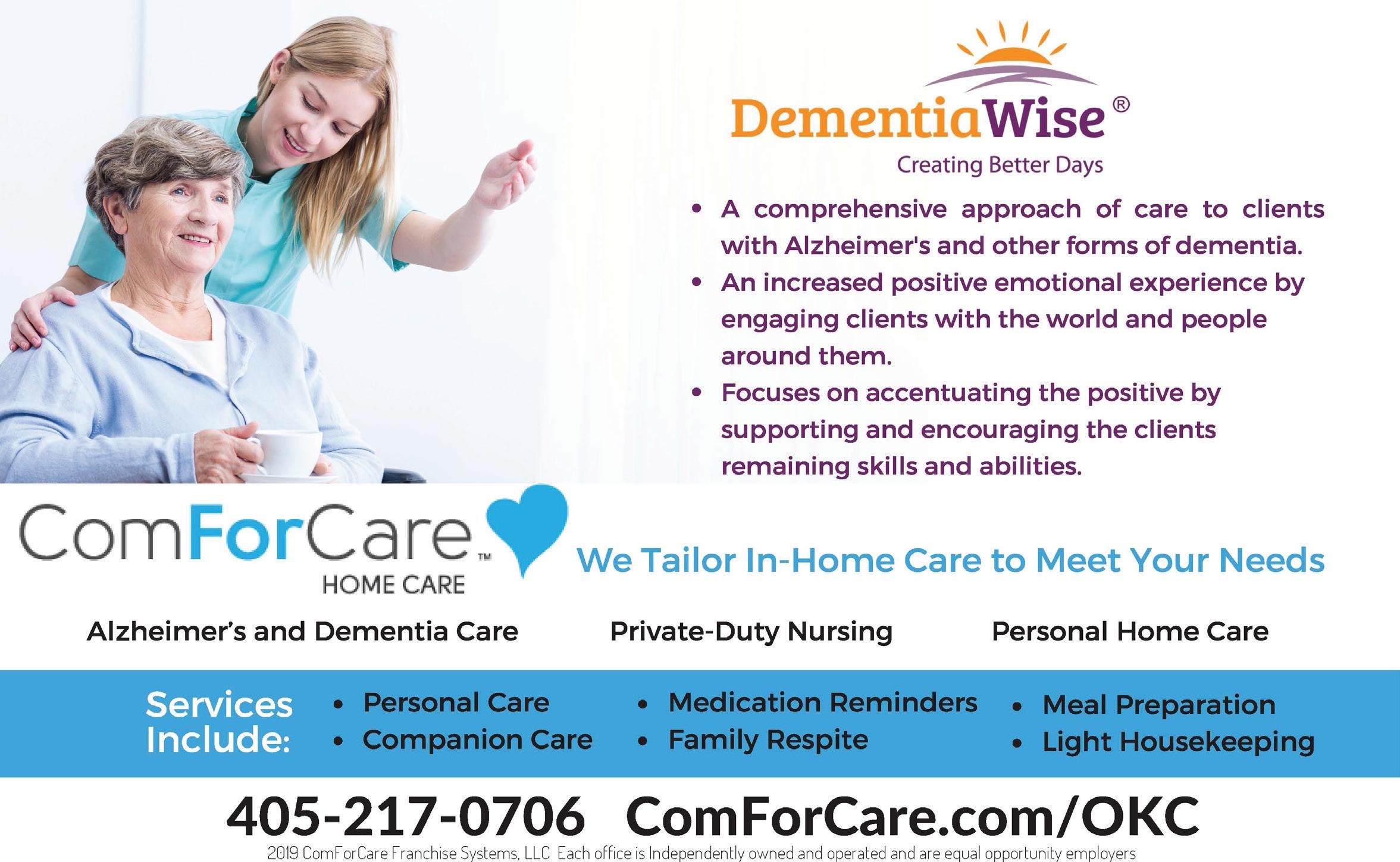
4 minute read
Caregivers Corner
CAREGIVERS O R N E R
By Kathy Cocks, RN
AGE SUCCESSFULLY BY REDUCING INFLAMMATION
Mrs. Black answered my nursing questions about her husband who had Parkinson’s Disease and accompanying Lewy Body Dementia. The next thing I knew her eyes welled up with tears and unable to hold them back any longer she buried her head in her hands bawling. “Some days I just don’t know what to do, I am trying to keep Joe home, but I am tired.” The next thing I know Mrs. Black begins to tell me about her torn rotator cuffs and her heart palpitations. She finally calms herself and says, “Two years ago when Joe was first diagnosed, I took care of him and thought I could manage.”
Unfortunately, this is a scenario I witness too often as a geriatric nurse. People, especially spousal caregivers do not recognize the physical and emotional toll caregiving takes. As people age, they begin to have an increase in inflammation markers in their system and this leads to an increase in depression, a weaker immune system, and more health problems. Spousal caregivers have higher inflammation markers than spouses who are not caregivers. The goal for successful aging then is to lower inflammation.
Many studies show that exercise reduces inflammation. Exercise is also known to release those feel-good hormones and assists in dealing with stress and depression. The most common complaint I get about exercise is that many of my clients and/or their spouses have achy joints and unsteady gaits. Simple exercises can be done even while sitting in a chair, check with your health care provider before starting an exercise regimen.
Exercise can be made enjoyable and safe. Sit in a chair and put on some marching music. The chair should have a sturdy back but no armrests. To warm up do 10 toe lifts, lifting your toes up and down, followed by 10 heel lifts. Ankle weights can be added to leg lifts. Take the weights off and march while seated to the music. If able swing your arms in circles to add more aerobic activity.
A Thera band is a 3-foot rubber band used to strengthen muscles. Many physical therapists use them, they cost about $10. They provide great resistance training for legs and arms. Grab a can of veggies in each hand and do some bicep, triceps curls and arm lifts.
All the exercises above are aerobic exercise which gets the heart pumping and strengthening exercises which build up our muscles. Many times, putting on some music will make exercise fun and it is something you can do with the person you are taking care of so both of you are getting exercise.
Besides exercise, another way to reduce inflammation is the foods we eat and foods we limit or avoid.
Foods to avoid
• processed foods • foods with added sugar or salt • unhealthful oils • processed carbs, which are present in white bread, white pasta, and many baked goods • processed snack foods, such as chips and crackers • premade desserts, such as cookies, candy, and ice cream • excess alcohol • In addition, people may find it beneficial to limit their intake of the following:
Gluten: Some people experience an inflammatory reaction when they consume gluten. If a person suspects that gluten is triggering symptoms, they may wish to consider eliminating it for a while to see if their symptoms improve.

Nightshades: Plants belonging to the nightshade family, such as tomatoes, eggplants, peppers, and potatoes, seem to trigger flares in some people with inflammatory diseases. There is limited evidence to confirm this effect, but a person can try cutting nightshades from the diet for 2–3 weeks to see if their symptoms improve.
Carbohydrates: There is evidence that a high-carb diet, even when the carbs are healthful, may promote inflammation in some people.
Lastly, an important way to reduce inflammation is to reduce stress. Many caregivers do not get a break from caregiving and feel guilty asking for help or seeking community resources. I know the past year has been tough for my family, my husband has had more health problems than usual, two surgeries, and a debilitating case of shingles. Amid dealing with this pandemic as a nurse I had to carry many household duties. I remember calling my pastor because I was the one putting my head in my hands bawling. He asked me what was one thing someone could do for me. I said, “I just need someone to bring me some meals.” That took one thing off my to-do list. We also hired someone to do our yard work. Trust me, I am a thrifty person and I do not like to hire someone to do something I think we can do ourselves. Paying someone to help has allowed me more time to exercise and eat healthy.

Our modern way of life with stress and highly processed foods can lead to chronic inflammation especially as we age. Many programs are available to exercise even sitting in a chair. Eat foods that make us healthy and learn to manage stress. Studies have shown these three areas of life if managed properly can lead to successful aging.
info@kathysconsulting.com





